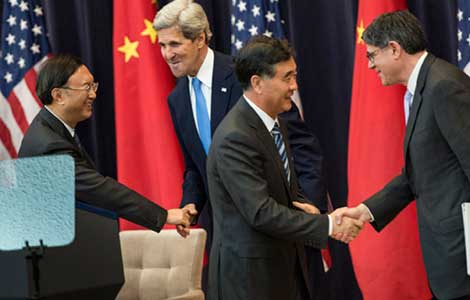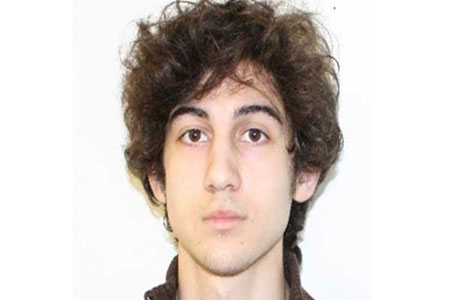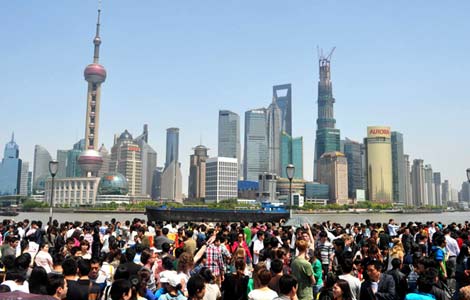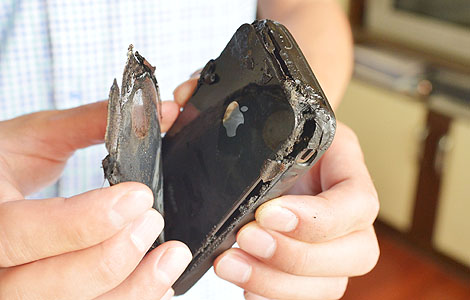Egypt tightens crackdown on Brotherhood
Updated: 2013-07-11 07:49
(Agencies)
|
||||||||
Following the speech, thousands of Islamists marched and clashed with Morsi opponents in the heart of Cairo and elsewhere in Egypt, leaving more than 30 dead and 200 injured.
In one of the most dramatic instances of violence that day, two Morsi opponents were killed when they were pushed off a roof by supporters of the ousted president in the second-largest city of Alexandria. Hamada Badr was stabbed and thrown off the roof, his father said. According to amateur video accessed by The Associated Press, a second man was hurled to his death and Morsi supporters were seen beating his lifeless body. The video appeared consistent with AP's reporting from the area.
Since then, both sides appeared to be running a campaign of fear. The military and supportive media have depicted the Brotherhood and its backers as promoting violence and endangering national security. The Brotherhood and pro-Morsi protesters have portrayed Defense Minister Abdel-Fattah el-Sissi as head of a "militia" that is seeking to annihilate Islamists, waging a fight akin to the civil war in Syria.
News of the arrest warrants did not surprise the protesters, who saw the move as an attempt to pressure the group's leadership to end the demonstration.
"We expected it," said Ayman el-Ashmawi. "Even if they arrest the biggest number of Muslim Brotherhood members, we want to say that the Muslim Brotherhood will leave this square only over our dead bodies - or the return of Dr. Mohammed Morsi."
Fathi Abdel-Wahab, a bearded protester in his 30s, said he and the others at the rally had legitimacy on their side.
"We will sacrifice ourselves and we will continue because we have a clear cause. We will defend it peacefully. ... We will never accept the military's coup," he said as he rested inside a tent near a group of people reciting verses from the Quran.
After a week of violence and mass demonstrations, Egyptians were hoping that Wednesday's start of Ramadan would calm the streets. The sunrise-to-sunset fast cuts down on daytime activity, although there were fears of unrest at night.
Late Wednesday, gunmen in a pickup truck opened fire on the convoy of a top military commander, Gen. Ahmed Wasfi, in the Sinai town of Rafah, near the border with Gaza, drawing fire from the accompanying troops, security officials said. Wasfi escaped unharmed, but a 5-year-old girl was killed in the clashes, said the officials, speaking on condition of anonymity because they were not authorized to speak to the media. One gunman was arrested.
Meanwhile, more than 1,000 Morsi supporters protested late Wednesday outside the presidential palace, where his opponents have continued to hold their ground, even after his ouster. Under heavy military guard, the pro-Morsi demonstrators chanted against el-Sissi, the defense minister, shouting, "What el-Sissi? We stepped over bigger shots." Some protesters formed a human chain to draw a line between them and the troops. After less than hour, they left the area peacefully.
The military-backed interim president, Adly Mansour, issued a fast-track timetable Monday for the transition. His declaration set out a seven-month timetable for elections but also a truncated, temporary constitution laying out the division of powers.
The accelerated process was meant, in part, to reassure the US and other Western allies that Egypt is on a path toward democratic leadership. But it has faced opposition from the very groups that led the four days of mass protests that prompted the military to remove Morsi.
The top liberal political group, the National Salvation Front, expressed reservations over the plan, saying it was not consulted. The Front said the declaration "lacks significant clauses while others need change or removal," but did not elaborate.
The secular, revolutionary youth movement Tamarod that organized the massive anti-Morsi demonstrations also criticized the plan, in part because it gives too much power to Mansour, including the authority to issue laws. A post-Morsi plan put forward by Tamarod called for a largely ceremonial interim president with most power in the hands of the prime minister.
At the heart of liberals' objections is that they wanted to remove broadly worded articles that Morsi's allies introduced into the constitution, giving Islamic laws a greater weight. They objected that at least one of those clauses remained in Mansour's declaration. Other objections centered on powers of the interim president.
The only Islamist party that backed military's ouster of Morsi has been vetoing any rewriting of the constitution.
New Prime Minister Hazem el-Beblawi, who was appointed Tuesday by Mansour, is holding consultations on a Cabinet. In what is seen as an attempt at reconciliation, el-Beblawi has said he will offer the Brotherhood, which helped propel Morsi to the presidency, posts in his transitional government.
A Brotherhood spokesman who spoke on condition of anonymity because he feared for his security said the group will not take part in an interim Cabinet, and that talk of national reconciliation under the current circumstances is "irrelevant."
The nascent government also will soon face demands that it tackle economic woes that mounted under Morsi, including fuel shortages, electricity cutoffs and inflation.
Kuwait joined other Gulf nations in offering financial aid to the new leadership, saying it would give a package worth $4 billion. On Tuesday, Saudi Arabia and the United Arab Emirates - both opponents of Morsi's Brotherhood - promised the cash-strapped Egyptian government $8 billion in grants, loans and badly needed gas and oil.
The donations effectively step in for Morsi's Gulf patron, Qatar, a close ally of the Brotherhood that gave his government several billion in aid during his year in office.
Most Viewed
Editor's Picks

|

|

|

|

|

|
Today's Top News
Talks 'help build trust' between China, US
Obama pushes House Republicans on immigration
Chinese researcher pleads guilty in US drug case
US Navy completes 1st unmanned carrier landing
Premier delivers pledge on reforms
China, Russia vow regular exchanges
Program to help migrant workers find better jobs
Saving dogs brings hefty bill for rescuers
US Weekly

|

|















